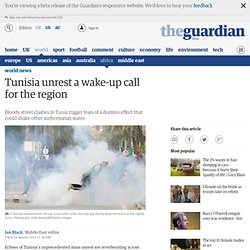

Where It Comes From and What It Means for Ben Ali. January traditionally has been Tunisia's month for political drama -- a general strike in January 1978; a Libyan-supported insurrection in January 1980; bread riots in January 1984.

This year, however, January will be hard-pressed to top the previous December. The last two weeks of 2010 witnessed the most dramatic wave of social unrest in Tunisia since the 1980s. Is Tunisia Next? Where are the democracy promoters on Tunisia? Barely a month goes by without a Washington Post editorial bemoaning Egypt's authoritarian retrenchment and criticizing the Obama administration's alleged failure to promote Arab democracy.

But now Tunisia has erupted as the story of the year for Arab reformers. The spiraling protests and the regime's heavy-handed, but thus far ineffective, repression have captured the imagination of Arab publics, governments, and political analysts. Despite Tunis's efforts to censor media coverage, images and video have made it out onto social media and up to Al Jazeera and other satellite TV. The "Tunisia scenario" is now the term of art for activist hopes and government fears of political instability and mass protests from Jordan to Egypt to the Gulf. The First WikiLeaks Revolution? A wake-up call for the region. Echoes of Tunisia's unprecedented mass unrest are reverberating across the Arab world – which is watching in fascination as one of the most repressive regimes in the regions makes far-reaching concessions to people power.

Protests over rising food and fuel prices triggered emergency economic measures from Jordan to Libya and Morocco this week as dramatic scenes of street clashes in the small north African country fuelled official nervousness about a domino effect that could shake other authoritarian states short on jobs, hopes and freedoms. "Every Arab leader is watching Tunisia in fear," tweeted one Egyptian commentator.